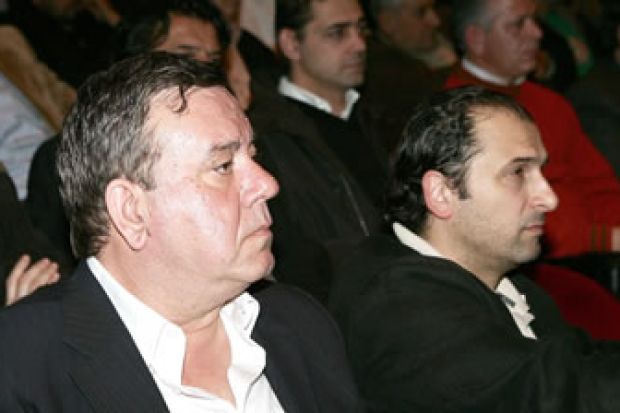Why Sports Psychology doesn’t help under-achievers & how to fix it
In every sport, there are athletes with breathtaking skills.
Yet, most of these guys never play anywhere close to their potential.
So how come one guy becomes a superstar while another guy—
with just as much talent—bombs?
As Yogi Berra, the ground-breaking mathematician, once said, “Baseball is 90% mental and the other half is physical.”
Of course, that’s not news. Everyone knows the importance of the
mental side of sports. Everyone knows that the mind is the cause of
duffs, yips, chokes, shanks, bricks, air balls, duck hooks, chunks,
banana balls, scratches, hanging curves, slumps, and whiffs.
And every athlete knows (or should know) that the reason he’s not
playing as well as he could can be traced to the three pounds of grey
matter between his ears.
The problem isn’t trivial. Under-performing athletes are such a huge demographic that it spawned an entire field of study.
Enter Sports Psychology.
Sports Psychology has since become über-respectable. Universities
offer Master’s degrees and Doctorates in it. There are professional
associations. Many sports psychologists have championship credentials,
“best-selling” books, impressive client lists peppered with Fortune 500
companies, and a garage full of motivational videos in which they star.
With their good intentions blazing, sports psychologists attack the
problem of athletic under-performance with a vengeance using a witches’
brew of so-called “performance enhancement techniques.”
And a witches’ brew it is—with no apparent consensus on what actually works.
Some guys preach visualization. Others swear by mindfulness. Still
others tout mental toughness. There are those who expound the virtues of
either positive attitude or courage or confidence or goal setting. I
should also mention those who claim non-judgment as the exalted path.
And of course, how could I leave out the advocates for hypnosis,
self-hypnosis, or any number of “relaxation techniques?” My apologies to
anyone or anything I left out.
Now, between you and me, you’d think that one of these techniques
would have actually “enhanced performance” by now and produced a swarm
of sweet-swinging success stories.
Clearly, that’s not been the case.
Even though every single major sports franchise has one of the
biggest names in sport psychology on its payroll, every single team, bar
none, still has its roster chocked full of gifted athletes who
under-achieve.
Something is obviously amiss.
Either the players aren’t listening or the methods promoted by sports psychologists aren’t worth a damn.
I vote for the latter.
To understand where Sports Psychology drops the ball and why these
various techniques fail, all we have to do is look at how the human
brain functions with respect to motion—something Sports Psychology
apparently never did.
So, let’s fix this oversight.
Since the brain operates the same way for every athlete no matter what the sport, we only need to consider two things:
- How the brain produces a fluid motion (a golf swing, tennis stroke, curve ball, etc.)
- How the brain disrupts fluid motion
Let’s start with #1.
When we were babies learning to walk, the process that resulted in
our first wobbly steps was stored by the brain so that it could be
repeated and improved upon.
[For those who want specifics, it was stored in the part of the brain
known as the basal ganglia. (Don’t worry; that fact won’t be on the
final exam.)]
On the other hand, the process that resulted in failures was not
stored. I guess the brain didn’t think it was useful to master the
technique of falling on our keister.
As more success got stored, our walking got more refined. Now, the
stored information on how to walk flows without restriction to our
bodies and we walk without having to think about how to move our legs or
feet.
This is how the brain learns how to perform any physical motion. It’s
been called “motor memory” or “muscle memory.” The muscles don’t
actually do the remembering; the basal ganglia in the brain does.
So, just like learning to walk, when we try to groove a golf swing or
a tennis stroke, the brain stores the information on how we did the
successful strokes and ignores the failures.
The more times we repeat the skill successfully during practice, the
more refined and ingrained our muscle memory becomes. So when a
competitive situation calls for a crisp backhand, the basal ganglia
already has that well-practiced backhand on file and is ready, willing, and able to deliver that information to the body.
In a perfect world, our body would instantaneously receive this
muscle memory from the basal ganglia and execute a stinging backhand
down the line, thereby catching our opponent flatfooted.
When muscle memory flows freely to the body, we get fluid motion. And that’s what happens in a perfect world.
Alas, the world isn’t always so perfect.
It turns out there’s another part of our brain that we must account
for. It’s the prefrontal cortex—the part of the brain responsible for
thinking, planning, analyzing, evaluating, and decision-making.
[Now, just so there’s no mistake, let me say from the outset that the
prefrontal cortex is a wonderful thing. It’s actually the brain’s CEO
(chief executive officer). And far be it from me to disrespect Da Boss.]
However, the prefrontal cortex has this nasty habit of intercepting
the flow of muscle memory to the body whenever it feels the need to
exert some additional control over a motion.
For example, the prefrontal cortex could want that the ball to be hit
extra hard. Or, it could get nervous and insert some caution or some
sense of urgency about getting the ball over the net, or in the basket,
or over the plate, or on the green. There can be innumerable ways the
prefrontal cortex tries to influence a motion.
Even though this type of thinking may seem completely natural during
an athletic contest (it may even seem to be a good “game plan”), it
turns out to be the kiss of death if our ultimate desire is to hit,
shoot, or pitch the ball like we grooved in practice.
Let me explain why.
When the prefrontal cortex tries to control muscle memory even just a tiny bit (which it almost
always
does), another part of the brain (the cerebellum) which governs the
fast twitch muscles gets overshadowed. When that happens, the fast
twitch muscles (the ones that give finesse, touch, and speed to an
athletic motion) aren’t able to fire on time. As a result, the bulkier,
core muscles end up dominating.
What then are we left with?
A shot/stroke/pitch/swing/routine/dive/kick that is forced . . .
muscled . . . awkward . . . rushed . . . out-of-sync . . . or flawed.
Now guess what causes the prefrontal cortex to get involved in an athletic motion in the first place.
You probably guessed right! The prefrontal cortex gets involved when
it is under stress or feels pressure. It also interferes with a motion
when it just plain “thinks” about what is needed.
This is the real reason why a motion breaks down. It’s the real
reason why an athlete doesn’t perform up to his ability in competition.
It’s how athletic performance loses fluidity, power, and effectiveness.
This is what keeps an athlete
out of the Zone!
When muscle memory is
not allowed to flow freely to the body, the body is
unable to perform the motion as well as it could.
Needless to say, we’ve all experienced this. When feeling pressure or
when our minds are filled with racing thoughts, our performance becomes
stiffer, more flawed, and more conservative.
The implications of this explanation are enormous.
For one, this analysis calls into question the various methods used
by sports psychologists. None of them do anything to prevent the
prefrontal cortex from sneaking in and sabotaging muscle memory. In
fact, many of them actually encourage the prefrontal cortex to get more
involved. And that just makes matters worse.
But Sports Psychology’s failure is small potatoes compared to a more
devastating way the prefrontal cortex can disrupt performance.
And that’s when an athlete looks at his motion in terms of any of its
parts.
Every athlete should know that the perfect, well-practiced motion
already exists
in its completeness in his basal ganglia and that any flaw which shows
up is caused by one thing and one thing only—interference by the
prefrontal cortex. Nothing else!
So trying to adjust the release point of the hand or the rotation of the hips or the follow-through,
especially in competition, is equivalent to shooting yourself in the foot.
The key to athletic success is a
quiet prefrontal cortex.
And while that may sound complicated, it’s not. We’ve all had the
experience when our prefrontal cortex did not meddle in a stroke. At
those times it felt like the perfect stroke happened all by itself,
without our even thinking about it.
Bingo!
And athletes who have had this experience over a longer stretch of
time than only one stroke refer to it as “being in the Zone.”
Interestingly, their descriptions are practically identical: “I wasn’t
thinking.” “Everything was effortless.” “I was playing better than I
ever played.” “The experience was more wonderful than winning.”
Jackpot!
Of course, the most successful athletes
intuitively
understand the need for a quiet prefrontal cortex. They just use simpler
words and talk about their need “to get out of their own way” and “to
let their natural instincts can take over.”
Unfortunately, those words are easy to say, but very few athletes
have a clue how to actually accomplish it on a consistent basis.
This is where my good friend Steven Yellin comes to the rescue.
Steven developed an elegant, easy-to-learn, easy-to-do system which
quiets the prefrontal cortex and lets the body access muscle memory
on demand.
(And mercifully, you don’t need to know your prefrontal cortex from a bar of soap to be successful at this.)
As a result, the strokes we practiced so diligently can now flow freely and fluidly, even in the white heat of competition.
But here’s the mind-blowing part.
When we perform with a quiet prefrontal cortex, we’re immediately
struck by what an enormous difference it makes. We realize we’re
actually a lot better than we originally thought possible.
Over the years I’ve had long talks with Steven, played tennis and
golf with him, and watched him teach others. I’ve marveled at the
unprecedented successes of those who learned—including a Major League
pitcher who recently tossed a perfect game, a professional bowler who
has won tournaments by bowling 300 in the final match, high school kids
who have won state tennis championships, and golfers excelling on the
pro tour.
His approach has literally salvaged careers of professional ball
players who were considered busts and on their way out of Major League
Baseball. The stories are epic.
In my opinion, this knowledge is something every athlete should know. So with Steven’s help, I put his lessons in a book titled
Instant Athlete, Instant Zone.
But instead of presenting the instruction in a dry textbook format, I
wove the whole thing into an engaging story about a sports nut who
encounters a wise old coach who reveals to him the secrets and methods
of this profound approach to sports. You’ll have a lot of fun reading .
. . and learning.
You’ll have even more fun applying it to your sport. I promise you’ll
be amazed at how much your mind had shackled your performance in the
past.
So, if you want to take your game to a new level, you owe it to
yourself to check it out. I’m absolutely certain you will find it to be
an eye-opening, heart-warming, and cortex-quieting book.
I especially recommend it to those who have come to realize that Sports Psychology does not have the answers.


